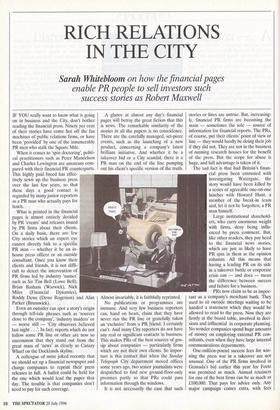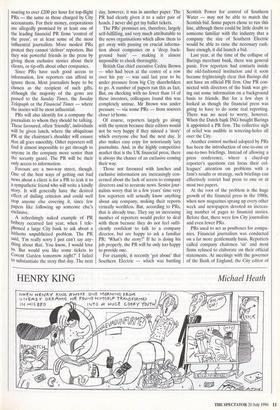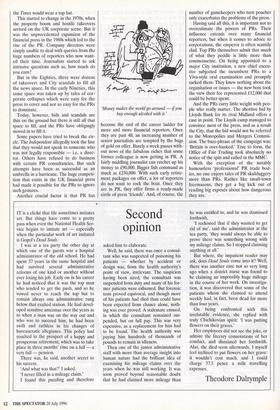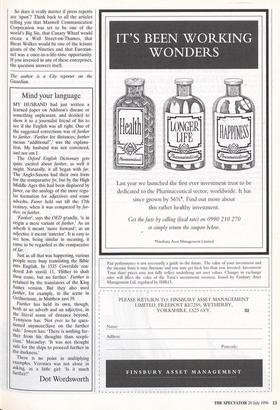RICH RELATIONS IN THE CITY
Sarah Whitebloom on how the financial pages enable PR people to sell investors such success stories as Robert Maxwell
IF YOU really want to know what is going on in business and the City, don't bother reading the financial press. Ninety per cent of their stories have come hot off the fax machines of public relations firms, or have been 'provided' by one of the innumerable PR men who stalk the Square Mile.
When it comes to 'spin doctoring', politi- cal practitioners such as Peter Mandelson and Charles Lewington are amateurs com- pared with their financial PR counterparts. This highly paid breed has effec- tively sewn up the business press over the last few years, so that these days a good contact is regarded by many junior reporters as a PR man who actually pays for lunch.
What is printed in the financial pages is almost entirely decided by PR 'events' and releases issued by PR firms about their clients. On a daily basis, there are few City stories which an expert eye cannot directly link to a specific PR man — whether it be an in- house press officer or an outside consultant. Once you know their clients and friends, it is not diffi- cult to detect the intervention of PR firms led by industry 'names' such as Sir Tim Bell (Lowe Bell), Brian Basham (Warwick), Nick Miles (Financial Dynamics), Roddy Dewe (Dewe Rogerson) and Alan Parker (Brunswick).
Even an outsider can spot a story's origin through tell-tale phrases such as 'sources close to the company', 'industry insiders' or — worse still — 'City observers believed last night ...'. In fact, reports which do not follow some PR line or other are now so uncommon that they stand out from the great mass of 'news' as clearly as Canary Wharf on the Docklands skyline.
A colleague of mine joked recently that we should set up a financial newspaper and charge companies to reprint their press releases in full. A ballot could be held for the one which would lead the paper that day. The trouble is that companies don't need to pay for such coverage. A glance at almost any day's financial pages will betray the great fiction that this is news. The remarkable similarity of the stories in all the papers is no coincidence. There are the carefully managed, set-piece events, such as the launching of a new product, concerning a company's latest brilliant initiative. And whether it be a takeover bid or a City scandal, there is a PR man on the end of the line pumping out his client's specific version of the truth.
Almost invariably, it is faithfully reprinted. No publications or programmes are immune. And very few business reporters can, hand on heart, claim that they have never run the PR line or gratefully taken an 'exclusive' from a PR friend. I certainly can't. And many City reporters do not have any real or significant contacts in business. This makes PRs of the best sources of gos- sip about companies — particularly firms which are not their own clients. So impor- tant is this contact that when the Sunday Telegraph City department moved offices some years ago, two senior journalists were despatched to find new ground-floor-only premises partly so that PRs could pass information through the windows.
It is not necessarily the case that such
stories or lines are untrue. But, increasing- ly, financial PR firms are becoming the main — sometimes the sole — source of information for financial reports. The PRs, of course, put their clients' point of view or line — they would hardly be doing their job if they did not. They are not in the business of running research houses for the benefit of the press. But the scope for abuse is huge, and full advantage is taken of it.
The sad fact is that had Britain's finan- cial press been entrusted with investigating Watergate, the story would have been killed by a series of agreeable one-on-one lunches with Howard Hunt, a member of the break-in team and, let it not be forgotten, a PR man himself.
Large institutional sharehold- ers, who carry enormous weight with firms, deny being influ- enced by press comment. But, like other readers, they pay heed to the financial news stories, which are just as likely to have PR spin in them as the opinion columns. All this means that having a leading PR on its side in a takeover battle or corporate crisis can — and does — mean the difference between success and failure for a business.
PRs now claim to be as impor- tant as a company's merchant bank. They used to sit outside meetings waiting to be handed a statement which they would be allowed to read to the press. Now they are firmly at the board table, involved in deci- sions and influential in corporate planning. No wonder companies spend huge amounts of money on employing external PR con- sultants, even when they have large internal communications departments.
One-million-pound success fees for win- ning the press war in a takeover are not unusual. One of the PR firms involved in Granada's bid earlier this year for Forte was promised as much. Annual retainers for one of the best firms can be as much as £100,000. That pays for advice only. Any major campaign comes extra, with fees soaring to over £200 per hour for top-flight PRs — the same as those charged by City accountants. For their money, corporations are allegedly promised by at least one of the leading financial PR firms 'control of the press', or at least some of the most influential journalists. More modest PRs protest they cannot 'deliver' reporters. But they win powerful friends in the press by giving them exclusive stories about their clients, or tip-offs about other companies.
Since PRs have such good access to information, few reporters can afford to ignore them. Most journalists hope to be chosen as the recipient of such gifts, although the majority of the gems are passed to the Sunday Times, the Sunday Telegraph or the Financial Times — where the stories will be most influential.
PRs will also identify for a company the journalists to whom they should be talking. These favoured, often 'friendly', individuals will be given lunch, where the ubiquitous PR at the chairman's shoulder will ensure that all goes smoothly. Other reporters will find it almost impossible to get through to anyone in the company more senior than the security guard. The PR will be their only access to information.
Favours are a two-way street, though. One of the best ways of getting out bad news about a client is for a PR to leak it to a sympathetic friend who will write a kindly story, It will generally have the desired effect of dulling criticism and could well stop anyone else covering it, since few papers like following up someone else's exclusive.
A refreshingly naked example of PR bribery occurred last year, when I tele- phoned a large City bank to ask about a hitherto unpublicised problem. The PR said, 'I'm really sorry I just can't say any- thing about that. You know, I would love to. But would you like some tickets to Covent Garden tomorrow night?' I failed to substantiate the story that day. The next day, however, it was in another paper. The PR had clearly given it to a safer pair of hands. I never did get my ballet tickets.
The PRs' promises are, therefore, largely self-fulfilling, and very much attributable to the news organisations which allow them to get away with passing on crucial informa- tion about companies on a 'deep back- ground basis' — making it almost impossible to check thoroughly.
British Gas chief executive Cedric Brown — who had been at the centre of a row over his pay — was said last year to be under pressure from big City shareholders to go. A number of papers ran this as fact. But, on checking with no fewer than 14 of these investors, colleagues found this was completely untrue. Mr Brown was under pressure — via some PRs — from sources closer to home.
Of course, reporters largely go along with the system because their editors would not be very happy if they missed a 'story' which everyone else had the next day. It also makes easy copy for notoriously lazy journalists. And, in the highly competitive market that is the UK financial press, there is always the chance of an exclusive coming their way.
Those not favoured with lunches and exclusive information are increasingly con- cerned about the lack of access to company directors and to accurate news. Senior jour- nalists worry that in a few years' time very few reporters will actually know anything about any company, making their reports virtually worthless. But, according to PRs, that is already true. They say an increasing number of reporters would prefer to deal with them because they do not feel suffi- ciently confident to talk to a company director, but are happy to ask a familiar PR: 'What's the story?' If he is doing his job properly, the PR will be only too happy to provide one.
For example, it recently 'got about' that Southern Electric — which was battling
Scottish Power for control of Southern Water — may not be able to match the Scottish bid. Some papers chose to run this line, although there could be little doubt to someone familiar with the industry that a company the size of Southern Electric would be able to raise the necessary cash. Sure enough, it did launch a bid.
Last year, at the time of the collapse of Barings merchant bank, there was general panic. Few reporters had contacts inside the old-fashioned institution and it soon became frighteningly clear that Barings did not have an official PR firm. One PR con- nected with directors of the bank was giv- ing out some information on a background basis to friends. But for a few days it looked as though the financial press was going to have to do some real reporting. There was no need to worry, however. When the Dutch baiik ING bought Barings it appointed a PR firm. The collective sigh of relief was audible in watering-holes all over the City.
Another control method adopted by PRs has been the introduction of one-to-one or one-to-two briefings. Instead of allowing a press conference, where a clued-up reporter's questions can focus their col- leagues' attention on problems with a firm's results or strategy, such briefings can effectively restrict bad press to one or at most two papers.
At the root of the problem is the huge growth of the financial press in the 1980s, when new magazines sprang up every other week and newspapers devoted an increas- ing number of pages to financial stories. Before that, there were few City journalists and even fewer PRs.
PRs used to act as postboxes for compa- nies. Financial journalism was conducted on a far more gentlemanly basis. Reporters called company chairmen 'sir' and most firms refused to elaborate on their official statements. At meetings with the governor of the Bank of England, the City editor of
the Times would wear a top hat.
This started to change in the 1970s, when the property boom and hostile takeovers arrived on the UK corporate scene. But it was the unprecedented expansion of the financial press in the 1980s which led to the rise of the PR. Company directors were simply unable to deal with queries from the huge numbers of reporters who now want- ed their time. Journalists started to ask intrusive questions such as, how much do you earn?
But in the Eighties, there were dozens of takeovers and City scandals to fill all the news space. In the early Nineties, this same space was taken up by tales of cor- porate collapses which were easy for the press to cover and not so easy for the PRs to dominate.
Today, however, bids and scandals are thin on the ground but there is still all that space to fill, and the PRs have obligingly moved in to fill it.
Some papers have tried to break the cir- cle. The Independent allegedly took the line that they would not speak to someone who was not legally responsible — i.e. a direc- tor. Others have refused to do business with certain PR consultancies. But such attempts have been as successful as an umbrella in a hurricane. The huge competi- tion that exists in the UK financial press had made it possible for the PRs to ignore such gestures.
Another crucial factor is that PR has Money makes the world go around — if you buy enough alcohol with it.'
become the end of the career ladder for more and more financial reporters. Once they are past 40, an increasing number of senior journalists are tempted by the bags of gold on offer. Barely a week passes with- out news of the fabulous riches that some former colleague is now getting in PR. A fairly middling journalist can ratchet up his money to £90,000. Bigger fish command as much as £250,000. With such early retire- ment packages on offer, a lot of reporters do not want to rock the boat. Once they are in PR, they offer firms a ready-made circle of press 'friends'. And, of course, the number of gamekeepers who turn poacher only exacerbates the problems of the press. Having said all this, it is important not to overestimate the powers of PRs. Their influence extends over many financial reporters, but when it comes to advice to corporations, the emperor is often scantily clad. Top PRs themselves admit that much of what they peddle is little more than commonsense. On being appointed to a major City institution, a new chief execu- tive subjected the incumbent PRs to a Viva-style oral examination and promptly sacked them. They knew nothing about the organisation or issues — the new boss took the view their fee represented £12,000 that could be better spent.
And the PRs carry little weight with peo- ple who really matter. The abortive bid by Lloyds Bank for its rival Midland offers a case in point. The Lloyds camp managed to convince most of the press, and as a result the City, that the bid would not be referred to the Monopolies and Mergers Commis- sion. The buzz-phrase of the campaign was: 'Britain is over-banked.' True to form, the Office of Fair Trading took absolutely no notice of the spin and called in the MMC. With the exception of the notably humourless 'professional' PR trade bod- ies, no one enjoys tales of PR skulduggery more than PRs. Rather like small-town freemasons, they get a big kick out of reading big exposés about how dangerous they are. So does it really matter if press reports are 'spun'? Think back to all the articles telling you that Maxwell Communication Corporation was set to be one of the world's Big Six, that Canary Wharf would create a Wall Street-on-Thames, that Brent Walker would be one of the leisure giants of the Nineties and that Eurotun- nel was a once-in-a-life-time opportunity. If you invested in any of these enterprises, the question answers itself.
The author is a City reporter on the Guardian.





























































 Previous page
Previous page